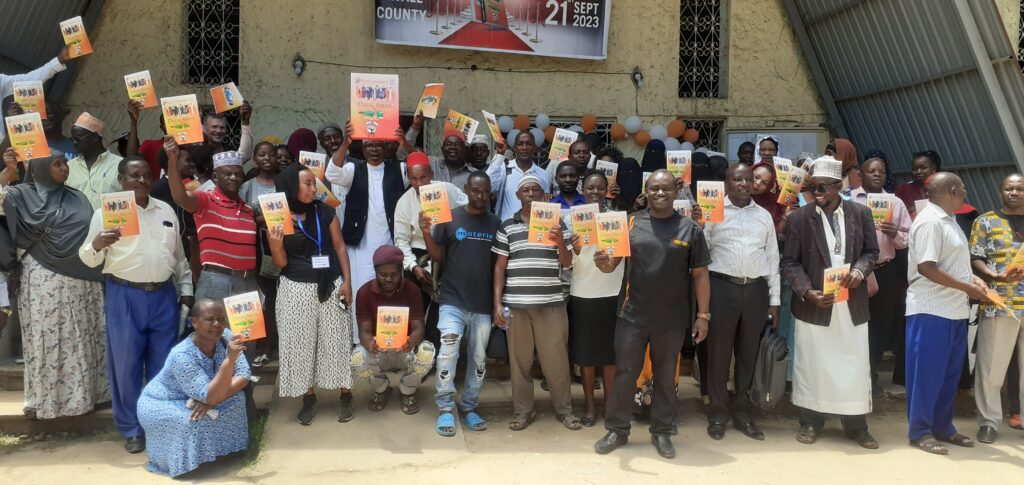By Caroline Katana
Faith Community Against Drug Abuse organization (FACADA) has launched a handbook to guide the clergy in the fight against drug abuse in Kwale County.
The handbook has been developed under International Aid Services Denmark funded by the Danish Government.
Faith-Based Organizations FBOs are trusted sources of information regarding a broad range of topics including alcohol and drug abuse prevention and counselling.
“They are spun into the lives of not only individuals but the hierarchy of complete societies, ” said Emmanuel Kahaso, FACADA project officer.
Alcohol usage among Kenyans aged 15 to 65 years stands at 12.2 percent, tobacco at 8.3 percent khat at 4.1 percent, and bhang at 1.0 percent, while multiple drug usage standards at 6.0 percent.
The Kenyan coast had the second highest usage of tobacco at 9.2 percent in the country.
Khat /miraa use disorders were also second highest on the Kenyan coast at 73 percent. Coast region recording the highest prevalence of bhang use disorders in the country.
Kwale County has more than 3,500 drug addicts according to Teens Watch rehabilitation center statistics of 2020.
Addressing the media after the launch of the faith leader’s handbook at Free Pentecostal Fellowship Kenya church (FPFK) Ukunda branch, Kahaso said substance use disorders and the use of psychoactive substances continue to be major issues in the world today.
“The use of psychoactive substances has been proven to have negative social effects, such as emotional dysregulation, antisocial behavior and poor patterns of relationship building,” he said.
According to WHO Statistics of 2015 young people, families, workplaces and communities have all been particularly negatively impacted by this drug abuse.
Kahaso noted that the strategies presented in the manual book are aligned and relevant to all who have a role in addressing the physical, social, emotional and spiritual health and welfare of members of the congregation.
“The book will therefore give religious communities an opportunity to invest their energy and resources towards reducing their use and abuse by all people in the society,” he said.
A survey conducted by NACADA indicates that the most commonly abused drugs and substances in Kenya are alcohol, tobacco, cannabis, glue, miraa and psychotropic substances such as cocaine.
Kwale County like all other Kenyan counties suffers from unemployment of the youth with over 10,000 jobless young people in the county.
NACADA’s senior public education and advocate officer Lucy Wanjiku, said they are partnering with different stakeholders to end drug menace.
“In the coastal region, we have experienced increasing numbers of heroin users so we are trying to bring together community-based organizations to help the recovery of heroin users. We have the Kombani rehabilitation center in Kwale County whereby NACADA partnered with the county government of Kwale to assist drug addicts,” said Wanjiku.
Wanjiku confirmed drug abuse to have contributed to mental health disorders.
“Substance use affects brain cells making the user develop abnormal behavior. Also, drugs contribute to depression or psychosis, “noted Wanjiku.
She urged parents to take caution with their children to ensure they don’t engage in drug abuse.
“Children as young as 6 to 9 years are alcohol and bhang addicts and this is due to poor parenting. Parents have neglected their responsibilities to their children, it is ideal for parents to raise their children in a religious foundation,” emphasized Wanjiku.
She said that NACADA is planning to carry out a life skills program in schools targeting grade 5 pupils.
FACADA champion Sheikh Hamisi Mwachirumu applauded the project saying the handbook will empower them.
“This book will give us strength to reach communities at the grassroots level and equip our day-to-day teachings because the book captured photos of every drug substance for easy understanding unlike before where we could not differentiate or name drug substances,” he said.
Pastor Geoffrey Wanyoike of FPFK church in Ukunda affirmed the project will eliminate religious differences.
“This project brought love and religious tolerance among clerics unlike before when they would work separately. Today we have joined hands to fight drug abuse in our communities guided by this handbook,” he said.
Thomas Banner working for International Aid Services Denmark Organisation said they are working closely with the FPFK church in a number of projects including climate resilience.
“Here in Kwale county is engaging church leaders on challenges facing communities and they have focused on drug abuse because young people have engaged in drug abuse which is destroying their lives so faith leaders are trying to come up with solutions,” said Banner.
The International Aid Services Denmark is working in 7 to 8 countries on the African continent.


